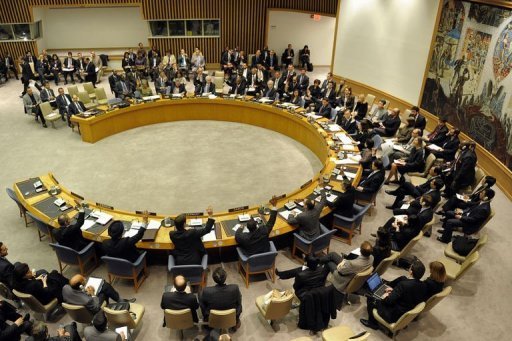United Nation Security Council hits Muammar Gaddafi’s regime with sanctions over atrocities committed against people
After long days of 'suspicious' international silence towards the crimes against humanity committed by the Libyan regime headed by long-time ruler Muammar Gaddafi, the United Nations Security Council moved to hit the mentioned regime with 'sanctions,' a late move which seemed to be an ‘achievement’ according to the world’s top leaders.
SANCTIONS... TO END VIOLENCE
The UNSC unanimously ordered a travel and assets ban on Gaddafi's regime and a crimes against humanity investigation into the bloodshed blamed on the Libyan strongman, ratcheting up pressure on him to quit before any more blood is shed in a popular revolt against his rule.
The meeting also called for an immediate arms embargo against Libya, where the UN says more than 1,000 people have been killed in attacks blamed on Gaddafi loyalists.
The council made a new demand for an immediate end to the violence, which it said had been incited "from the highest level" of Libyan leaders.
The travel ban and assets freeze in Resolution 1970 targets the 68-year-old Libyan leader, four of his sons and daughter Aisha, and top defense and intelligence officials accused of playing a role in the bloodshed. The 16 names on the sanctions list were cut from 22 during negotiations. Diplomats said this was a move to encourage senior regime members to turn against Gaddafi.
The 15-nation council passed the resolution hours after Gaddafi's police abandoned parts of the capital Tripoli to the revolt that has swept Libya and the United States bluntly told him he must go.
BLOODSHED REFERRED TO ICC
The bloodshed was referred to the International Criminal Court because the council said "the widespread and systematic attacks currently taking place in Libya against the civilian population may amount to crimes against humanity."
Under the resolution all arms sales to Libya must stop immediately. The resolution also called on Libya to let in humanitarian supplies and to protect foreigners.
WORLD SHOCKED!
Meanwhile, Britain's UN ambassador Mark Lyall Grant who led the resolution campaign with France, Germany and the United States, said that the measures were "a powerful signal of the determination of the international community to stand with the people of Libya and determine their own future."
Reflecting the unanimous condemnation of Gaddafi, South Africa's envoy Baso Sangqu said the whole world had been shocked by "the untold atrocities".
For her part, US ambassador to the United Nations, Susan Rice, said the council "has come together to condemn the violence, pursue accountability, and adopt biting sanctions, targeting Libya's unrepentant leadership."
The landmark vote saw the United States support referring a crisis case to the International Criminal Court for the first time.
MORAL SUPPORT
Libya's deputy ambassador, Ibrahim Dabbashi, who has turned against the Gaddafi regime, said the resolution would give "moral support for the people who are resisting and being fired upon by the regime."
Libya's UN ambassador, Abdurrahman Shalgam, the country's former foreign minister, also made an impassioned plea for the council to take action against the "atrocities" committed by his childhood friend Kadhafi.
In negotiations, several countries raised reservations about referring Libya to the International Criminal Court. But Shalgham wrote a letter to the council on Saturday expressing strong backing for the resolution and involving the ICC. "Faced with the atrocities we are seeing, impunity is no longer an option," French UN envoy Gerard Araud told the council.
